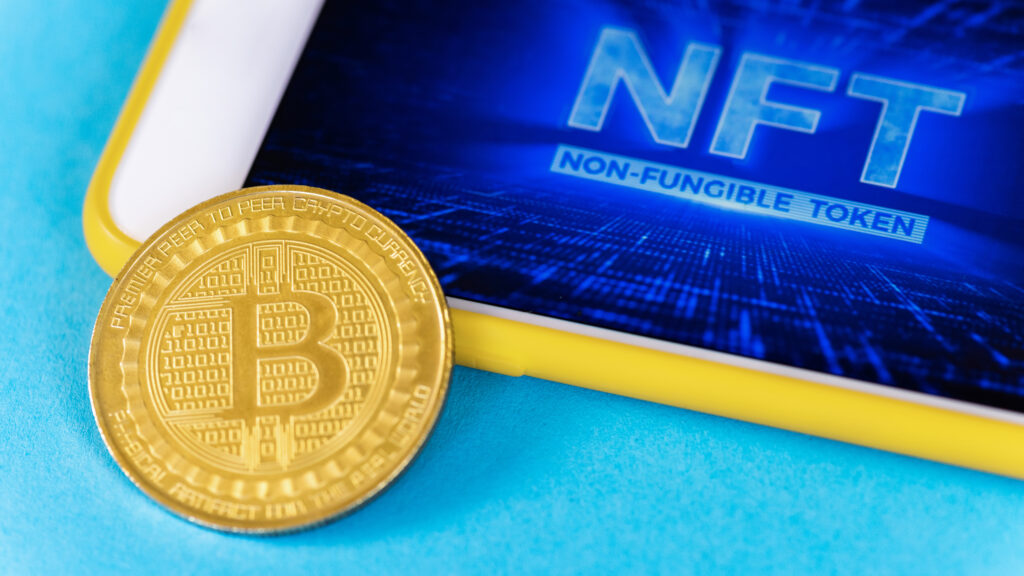What is NFT marketplace?- Wondered?
Are you intrigued by the buzz around NFT marketplaces but unsure where to start?
In a world rapidly embracing digital assets, understanding NFT marketplaces is crucial. What sets them apart? How do they revolutionize ownership in the digital realm?
In essence, NFT marketplaces are platforms where unique digital assets, verified by blockchain technology, are bought, sold, and traded.
Unlike traditional currencies, NFTs represent ownership of distinct items like digital art, music, or virtual real estate. Imagine owning an original Picasso in the digital space—NFTs make this a reality.
Here what is Instagram marketplace?
What is nft marketplace?
An NFT marketplace is a digital platform where Non-Fungible Tokens (NFTs) are bought, sold, and traded.
NFTs are unique digital assets that represent ownership or proof of authenticity of a specific item or piece of content using blockchain technology.
These marketplaces enable creators, artists, and collectors to tokenize and sell digital art, music, videos, virtual real estate, and other digital assets as NFTs.
Each NFT has a distinct identifier, ensuring its uniqueness and scarcity.
Transactions on NFT marketplaces are recorded on a blockchain, typically on platforms like Ethereum or Binance Smart Chain, providing transparency and security.
NFT marketplaces have gained popularity as a means for creators to monetize digital content and for collectors to own and trade unique digital assets in the burgeoning digital economy.
Here, how to sell on the Instagram marketplace?
How Do NFT Marketplaces Work?
NFT marketplaces operate through blockchain technology, specifically utilizing smart contracts to facilitate the creation, sale, and transfer of Non-Fungible Tokens (NFTs).
Creators upload digital content, such as art, music, or videos, to the marketplace.
The content is then tokenized, transforming it into a unique NFT with a distinct identifier and ownership details.
These NFTs are typically built on blockchain platforms like Ethereum, Binance Smart Chain, or others.

When a buyer purchases an NFT, a smart contract automatically executes the transfer of ownership, updating the blockchain ledger to reflect the new owner.
The blockchain ensures transparency, security, and authenticity, as the entire transaction history is recorded and immutable.
Payment for NFTs is often made in cryptocurrency, and the smart contracts define the terms of the sale, including royalties for creators on subsequent resales.
NFT marketplaces thus provide a decentralized and transparent ecosystem for creators and collectors to engage in digital asset transactions.
Here, does marketplace insurance cover dental?
Facts about NFT marketplaces
- Blockchain Technology: NFT marketplaces rely on blockchain technology, with Ethereum being a popular platform, to ensure secure and transparent transactions through decentralized ledgers.
- Unique Tokenization: NFTs represent unique digital assets, and each token has a distinct identifier, guaranteeing the scarcity and authenticity of the digital content it represents.
- Digital Asset Variety: NFT marketplaces support a wide range of digital assets, including art, music, videos, virtual real estate, and more, providing a diverse ecosystem for creators and collectors.
- Smart Contracts: Smart contracts are integral to NFT transactions, automating processes like ownership transfers, royalty payments, and defining the terms of sales without the need for intermediaries.
- Cryptocurrency Transactions: NFTs are typically bought and sold using cryptocurrencies, providing a seamless and borderless payment system that transcends traditional fiat currencies.
- Global Accessibility: NFT marketplaces enable global participation, allowing creators and collectors from around the world to engage in the buying, selling, and trading of digital assets.
- Royalties for Creators: Smart contracts can enforce automatic royalty payments to creators on secondary sales, ensuring ongoing compensation for their work even after the initial sale.
- Transparency and Immutability: The blockchain ledger records all transactions, ensuring transparency and immutability, which adds an extra layer of security and trust to the NFT marketplace ecosystem.
- Growing Popularity: NFT marketplaces have gained immense popularity in recent years, with high-profile sales, celebrity involvement, and increased mainstream recognition contributing to their rapid growth.
- Challenges and Environmental Concerns: Despite their popularity, NFTs and their associated blockchain platforms have faced criticism due to environmental concerns related to energy consumption, particularly with Ethereum’s proof-of-work consensus mechanism.
Here, can you use zelle on Facebook marketplace?
Types of NFT marketplaces
NFT marketplaces come in various types, catering to different niches and preferences within the digital asset space:
- General NFT Marketplaces: Platforms like OpenSea and Rarible cater to a broad spectrum of digital assets, offering a diverse range of art, collectibles, and virtual goods.
- Art-specific Platforms: Some marketplaces, such as SuperRare and Foundation, focus exclusively on digital art, providing a curated space for artists to showcase and sell their unique creations.
- Gaming NFT Marketplaces: Platforms like Decentraland and Axie Infinity cater to the gaming community, allowing users to buy, sell, and trade virtual assets, including in-game items and characters.
- Music and Entertainment Platforms: Marketplaces like Audius and Mintable specialize in NFTs related to music, videos, and entertainment, enabling creators to tokenize and monetize their digital content.
- Real Estate and Virtual Land Platforms: Decentralized platforms like Decentraland and Somnium Space facilitate the buying and selling of virtual real estate, allowing users to own and develop digital landscapes.
- Domain Names: Marketplaces like Unstoppable Domains focus on NFTs for blockchain-based domain names, providing users with unique and decentralized web addresses.
These diverse types of NFT marketplaces cater to specific interests and industries, contributing to the expanding and versatile nature of the NFT ecosystem.
Here, what is Facebook marketplace etiquette?
What are NFT marketplaces?
NFT marketplaces are digital platforms that facilitate the creation, buying, selling, and trading of Non-Fungible Tokens (NFTs).
NFTs are unique digital assets that represent ownership or proof of authenticity of specific items or content using blockchain technology.
Artists, musicians, gamers, and other creators tokenize their digital work, turning it into NFTs with distinct identifiers.
These marketplaces, often built on blockchain platforms like Ethereum, serve as decentralized platforms where users can browse, purchase, and sell these unique digital assets.
Smart contracts on the blockchain automate ownership transfers, royalties, and other transaction details, ensuring transparency and security.
NFT marketplaces have gained immense popularity, providing a new way for creators to monetize their digital content and for collectors to own and trade rare and unique digital assets in the emerging digital economy.
Here, does Tikto Creator marketplace lower views?
Where to buy NFTs
To buy NFTs, individuals can explore various online NFT marketplaces. Some popular platforms include:
- OpenSea: One of the largest and most diverse NFT marketplaces, offering a wide range of digital assets.
- Rarible: A decentralized marketplace that allows artists to create, sell, and trade their NFTs directly.
- SuperRare: Focused on digital art, SuperRare provides a curated space for artists to showcase and sell their unique creations.
- Decentraland: Geared towards virtual real estate and assets within a decentralized virtual world.
- Crypto.com/NFT: An NFT platform associated with the Crypto.com ecosystem, providing a marketplace for various digital collectibles.
- Foundation: A platform for exclusive digital art and limited edition creations.
- NBA Top Shot: Specifically for basketball fans, offering NFTs representing memorable NBA moments.
Buyers typically need a cryptocurrency wallet to make purchases, and transactions are conducted using cryptocurrencies.
Thus, such as Ethereum or other supported tokens depending on the platform.
It’s important to research and choose a reputable platform based on the desired type of NFT and personal preferences.
Tips for choosing an NFT marketplace
When selecting an NFT marketplace, consider the following tips to ensure a positive experience:
- Reputation: Opt for well-established and reputable platforms with a track record of secure transactions and satisfied users.
- User Interface: Choose a marketplace with an intuitive and user-friendly interface, making it easy to navigate, buy, and sell NFTs.
- Supported Cryptocurrencies: Ensure the marketplace supports the cryptocurrency you intend to use for transactions, commonly Ethereum, and check for low transaction fees.
- Diversity of Content: Select a platform that caters to your specific interests, whether it’s art, music, gaming, or other digital assets.
- Creator-Friendly Features: Look for marketplaces that offer fair royalty structures, allowing creators to earn on secondary sales.
- Security Measures: Prioritize platforms with robust security measures to protect your digital assets and personal information.
- Community and Support: Consider the level of community engagement and customer support offered by the platform for a smoother experience and issue resolution.
- Blockchain Compatibility: Check the blockchain on which the marketplace operates, as it affects factors like transaction speed, fees, and environmental impact.
By considering these factors, you can make an informed decision and choose the NFT marketplace that aligns with your preferences and goals.
How to buy NFT assets
To buy NFT assets, follow these general steps:
- Get a Cryptocurrency Wallet: Choose a wallet that supports the cryptocurrency required for the NFT marketplace, often Ethereum. Popular wallets include MetaMask and Coinbase Wallet.
- Acquire Cryptocurrency: Purchase the necessary cryptocurrency (e.g., ETH) from a cryptocurrency exchange.
- Choose an NFT Marketplace: Select a reputable NFT marketplace that aligns with your interests. Popular options include OpenSea, Rarible, or specialized platforms like NBA Top Shot.
- Connect Wallet to the Marketplace: Connect your cryptocurrency wallet to the chosen marketplace. This is typically done through wallet browser extensions.
- Browse and Select NFTs: Explore the marketplace, find NFTs of interest, and click on the desired item for detailed information.
- Place a Bid or Buy: Depending on the marketplace, you can place bids on auctioned items or buy them directly. Follow the on-screen instructions to complete the transaction.
- Confirm and Verify Ownership: After purchasing, confirm the transaction and verify ownership details on your wallet and the blockchain.
By following these steps, you can successfully navigate the process of buying NFT assets in the digital marketplace.
NFT blockchain options
Several blockchain options support the creation and trading of Non-Fungible Tokens (NFTs), each with its own features and characteristics.

- Ethereum (ETH): The most widely used blockchain for NFTs, Ethereum’s ERC-721 and ERC-1155 standards define NFT functionalities. However, it faces challenges like scalability and environmental concerns due to its proof-of-work consensus.
- Binance Smart Chain (BSC): Offering a more energy-efficient alternative, BSC is gaining popularity. Its compatibility with Ethereum’s standards facilitates easy migration and interoperability.
- Flow: Known for its speed and scalability, Flow is designed specifically for NFTs and has gained attention for hosting projects like NBA Top Shot.
- Tezos: Focused on sustainability, Tezos utilizes a proof-of-stake consensus. Its standards, such as FA2, support NFTs with environmental considerations.
- Polygon (formerly Matic): Operating as a Layer 2 scaling solution for Ethereum, Polygon enhances transaction speed and reduces costs while maintaining Ethereum compatibility.
- WAX: Tailored for decentralized applications and NFTs, WAX aims for user-friendly experiences with features like staking and resource management.
Choosing an NFT blockchain involves considering factors like transaction costs, speed, environmental impact, and compatibility with existing projects or marketplaces.
Is the NFT Market Growing?
The NFT (Non-Fungible Token) market was experiencing significant growth, and this trend is expected to continue.
The NFT market had witnessed a surge in popularity with high-profile sales, increased artist and celebrity involvement, and a growing mainstream interest in digital assets.
The diverse use cases of NFTs, spanning art, music, gaming, and virtual real estate, contributed to the market’s expansion.
However, it’s important to note that the cryptocurrency and blockchain space can be dynamic, and market conditions may evolve.
To obtain the most current information on the NFT market, it is advisable to check the latest sources and updates.
Related faq’s
Is NFT a good investment?
The investment value of NFTs can vary.
While some NFTs have witnessed substantial returns and gained cultural significance, the market is highly speculative and volatile.
Potential investors should conduct thorough research, consider the specific NFT’s uniqueness, demand, and the reputation of the creator or project before making investment decisions.
It’s advisable to approach NFT investments with caution and only invest what one can afford to lose.
How does an NFT marketplace work?
An NFT marketplace operates by using blockchain technology to create, buy, and sell Non-Fungible Tokens (NFTs).
Creators upload digital content, which is then tokenized into unique NFTs.
These tokens are bought, sold, and traded on the marketplace, with ownership and transaction details recorded on the blockchain.
Smart contracts automate processes such as ownership transfers and royalties, ensuring transparency and security.
Users need cryptocurrency wallets to participate, and transactions are typically conducted using cryptocurrencies like Ethereum.
What is does NFT stand for?
NFT stands for “Non-Fungible Token.” It represents a unique digital asset that isnt replicated or replaced, distinguishing it from fungible assets like cryptocurrencies.
NFTs utilize blockchain technology, often on platforms like Ethereum, to establish ownership and authenticity of digital content, such as art, music, or videos.
Each NFT has a distinct identifier, ensuring its scarcity and uniqueness in the digital space.
Is an NFT a good investment?
The investment potential of NFTs is subjective and can be risky.
While some NFTs have fetched significant values, the market is highly speculative and volatile.
Factors like the uniqueness of the digital asset, creator reputation, and market demand influence potential returns.
It’s essential for investors to conduct thorough research and consider their risk tolerance before investing in NFTs.
Caution and careful consideration are advised, and one should only invest what they can afford to lose.
Is NFT marketplace profitable?
The profitability of an NFT marketplace varies and depends on factors such as platform fees, transaction volume, and user engagement.
Established platforms may generate profits through transaction fees, while emerging marketplaces might face challenges in building a user base.
Successful marketplaces can be profitable for both the platform and creators who earn from sales.
However, the evolving nature of the NFT market requires careful business strategies and adaptability to market trends for sustained profitability.
Conclusion:
In conclusion, navigating the vast world of NFT marketplaces unveils a digital realm where unique assets are tokenized and traded.
As the demand for digital ownership grows, these platforms empower creators and collectors alike.
Embrace the NFT revolution, where innovation meets artistry, forging a new era of digital transactions and creative expression.
